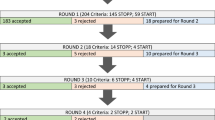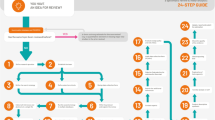Abstract
Background Low- and middle-income countries (LMICs) rely on available evidence when devising and implementing pharmaceutical policies. Aim of the review To provide a critical overview of systematic reviews of pharmaceutical policies, with particular focus on the relevance of such reviews in low- and middle-income countries. Methods A search for systematic reviews (SRs) of studies of the interventions of interest was conducted until May 2009 in MEDLINE, EconLit, CINAHL, the Cochrane site, ProQuest, EMBASE, JOLIS, ISI Web of Science, International Pharmaceutical Abstracts, International Network for Rational Use of Drugs, National Technical Information Service, Public Affairs Information Service, SourceOECD, the System for Information on Grey Literature in Europe, and the WHO library database. The search was updated to July 2013, based on the yields of the initial search strategy. Results 20 SRs that met all inclusion criteria were retrieved in full text. Four SRs were subsequently rejected on the basis of quality considerations and the findings of 16 SRs were extracted and their applicability in LMICs considered. Of these, 5 were Cochrane Reviews. All included SRs were published in English. SRs related to registration and classification policies, marketing policies, prescribing policies, reimbursement policies, policies on price and payments, co-payments and caps and multi-component policies were retrieved. No SRs related to patent and profit policies, sales and dispensing policies, policies that regulate the provision of health insurance, or policies on patient information were retrieved. Conclusion Only one of the systematic reviews retrieved utilised a study conducted in a developing country. The direct applicability of the evidence from these SRs in LMICs is limited. However, as middle-income countries move towards universal health coverage, the multi-component policies that govern reimbursement for medicines, and which impose caps on payments and co-payments by patients, may become more applicable. As such they will have direct implications for the practice of clinical pharmacy in such settings. Considerable effort will be needed to systemically review the available primary evidence from studies conducted in developing country settings, where such data exist.

Similar content being viewed by others
References
World Health Organization. Guidelines for developing national drug policies. Geneva: World Health Organization; 1988.
World Health Organization. How to develop and implement a national drug policy. 2nd ed. Geneva: World Health Organization; 2001.
Hogerzeil HV. The concept of essential medicines: lessons for rich countries. Br Med J. 2004;329(7475):1169.
Ross-Degnan D, Laing R, Santoso B, Ofori-Adjei D, Lamoureux C, Hogerzeil H. Improving pharmaceutical use in primary care in developing countries: a critical review of experience and lack of experience. In: 1st international conference on improving the use of medicines. Chiang Mai, Thailand; 1997.
le Grand A, Hogerzeil HV, Haaijer-Ruskamp FM. Intervention research in rational use of drugs: a review. Health Policy Plan. 1999;14(2):89–102.
Laing R, Hogerzeil H, Ross-Degnan D. Ten recommendations to improve use of medicines in developing countries. Health Policy Plan. 2001;16(1):13–20.
Ratanawijitrasin S, Soumerai SB, Weerasuriya K. Do national medicinal drug policies and essential drug programs improve drug use? A review of experiences in developing countries. Soc Sci Med. 2001;53(7):831–44.
World Health Organisation. Medicines use in primary care in developing and transitional countries: fact book summarising results from studies reported between 1990 and 2006. Geneva: World Health Organisation; 2009.
Aaserud M, Austvoll-Dahlgren A, Sturm H, Kosters JP, Furberg C, Grilli R, et al. Pharmaceutical policies: effects on rational drug use (protocol). Cochrane Database Syst Rev. 2006;2:CD004397.
Shojania K, Bero L. Taking advantage of the explosion of systematic reviews: an efficient MEDLINE search strategy. Eff Clin Pract. 2001;4(4):157–62.
World Bank. How we classify countries 2013 (9 October 2013). http://data.worldbank.org/about/country-classifications.
Ioannides-Demos LL, Ibrahim JE, McNeil JJ. Reference-based pricing schemes: effect on pharmaceutical expenditure, resource utilisation and health outcomes. Pharmacoeconomics. 2002;20(9):577–91.
Galizzi MM, Ghislandi S, Miraldo M. Effects of reference pricing in pharmaceutical markets: a review. Pharmacoeconomics. 2011;29(1):17–33.
Dylst P, Vulto A, Simoens S. The impact of reference-pricing systems in Europe: a literature review and case studies. Expert Rev Pharmacoecon Outcomes Res. 2011;11(6):729–37.
Cohen J, Millier A, Karray S, Toumi M. Assessing the economic impact of Rx-to-OTC switches: systematic review and guidelines for future development. J Med Econ. 2013;16(6):835–44.
Welage LS, Kirking DM, Ascione FJ, Gaither CA. Understanding the scientific issues embedded in the generic drug approval process. J Am Pharm Assoc. 2001;41:856–67.
Gilbody S, Wilson P, Watt I. Benefits and harms of direct to consumer advertising: a systematic review. Qual Saf Health Care. 2005;14(4):246–50.
Gosden T, Forland F, Kristiansen I, Sutton M, Leese B, Giuffrida A, Sergison M, Pedersen L. Capitation, salary, fee-for-service and mixed systems of payment: effects on the behaviour of primary care physicians. Cochrane Database Syst Rev. 2000;3:CD002215. doi:10.1002/14651858.CD002215.
Sturm H, Austvoll-Dahlgren AAA, Aaserud M, Oxman AD, Ramsay C, Vernby Å, Kösters JP. Pharmaceutical policies: effects of financial incentives for prescribers. Cochrane Database Syst Rev. 2007;3:CD006731. doi:10.1002/14651858.CD006731.
Green CJ, Maclure M, Fortin PM, Ramsay CR, Aaserud M, Bardal S. Pharmaceutical policies: effects of restrictions on reimbursement. Cochrane Database Syst Rev. 2010;8:CD008654.
Puig-Junoy J, Moreno-Torres I. Impact of pharmaceutical prior authorisation policies : a systematic review of the literature. Pharmacoeconomics. 2007;25(8):637–48.
Aaserud M, Austvoll-Dahlgren AAA, Kösters JP, Oxman AD, Ramsay C, Sturm H. Pharmaceutical policies: effects of reference pricing, other pricing, and purchasing policies. Cochrane Database Syst Rev. 2006;2:CD005979. doi:10.1002/14651858.CD005979.
Lee JL, Fischer MA, Shrank WH, Polinski JM, Choudhry NK. A systematic review of reference pricing: implications for US prescription drug spending. Am J Manag Care. 2012;18(11):e429–37.
Austvoll-Dahlgren A, Aaserud M, Vist G, Ramsay C, Oxman AD, Sturm H, et al. Pharmaceutical policies: effects of cap and co-payment on rational drug use. Cochrane Database Syst Rev. 2008;1:7017.
Lexchin J, Grootendorst P. Effects of prescription drug user fees on drug and health services use and on health status in vulnerable populations: a systematic review of the evidence. Int J Health Serv. 2004;34(1):101–22.
Carroll NV. How effectively do managed care organizations influence prescribing and dispensing decisions? Am J Manag Care. 2002;8(12):1041–54.
Lexchin J. Effects of restrictive formularies in the ambulatory care setting. Am J Manag Care. 2002;8(1):69–76.
Lu CY, Ross-Degnan D, Soumerai SB, Pearson SA. Interventions designed to improve the quality and efficiency of medication use in managed care: a critical review of the literature—2001–2007. BMC Health Serv Res. 2008;8:75.
Morrison A, MacKinnon NJ, Hartnell NR, McCaffrey KJ. Impact of drug plan management policies in Canada: a systematic review. Can Pharm J. 2008;141(6):332–8.
Olson BM. Approaches to pharmacy benefit management and the impact of consumer cost sharing. Clin Ther. 2003;25(1):250–72.
Pearson SA, Ross-Degnan D, Payson A, Soumerai SB. Changing medication use in managed care: a critical review of the available evidence. Am J Manag Care. 2003;9(11):715–31.
Ham R, Bero L, Laing R. Selection of essential medicines. World medicines situation 2011. 3rd ed. Geneva: World Health Organization; 2011.
Lagarde M, Palmer N. The impact of user fees on access to health services in low- and middle-income countries. Cochrane Database Syst Rev. 2011;13(4):CD009094.
Heads of State. Fourth BRICS Summit—Delhi Declaration 29 March 2012 (9 October 2013). http://mea.gov.in/bilateral-documents.htm?dtl/19158/Fourth+BRICS+Summit++Delhi+Declaration.
Acknowledgments
The assistance of Kent Ransom and Maryam Bigdeli, and the comments provided on drafts of the initial overview by Richard Laing and Kris Weerasuriya, are acknowledged with thanks.
Author information
Authors and Affiliations
Corresponding author
Ethics declarations
Funding
The initial overview was prepared for the Alliance for Health Policy and System Research, World Health Organization, and supported by an Agreement for Performance of Work (Project HQHSR0801837). The initial overview was presented as a poster at the 3rd International Conference on Improving Use of Medicines, Antalya, Turkey, 2011.
Conflicts of interest
None.
Rights and permissions
About this article
Cite this article
Gray, A.L., Suleman, F. The relevance of systematic reviews on pharmaceutical policy to low- and middle-income countries. Int J Clin Pharm 37, 717–725 (2015). https://doi.org/10.1007/s11096-015-0156-6
Received:
Accepted:
Published:
Issue Date:
DOI: https://doi.org/10.1007/s11096-015-0156-6




